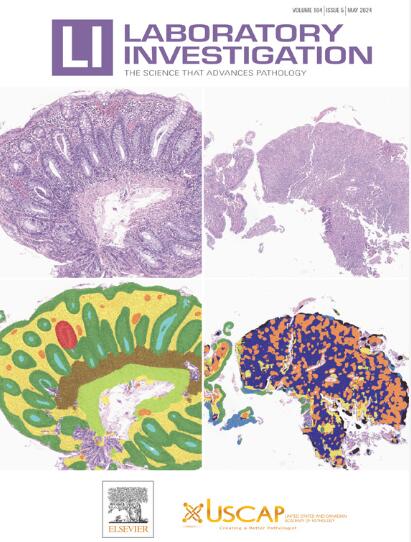HECW1-Mediated Ubiquitination of HIPK2 Drives Metastasis in Gastric Cancer Through the AKT Signaling Pathway
IF 5.1
2区 医学
Q1 MEDICINE, RESEARCH & EXPERIMENTAL
引用次数: 0
Abstract
E3 ubiquitin ligases, crucial enzymes in the ubiquitination pathway, significantly influence the development of malignant tumors, including gastric cancer (GC), by regulating the stability of oncogenic and tumor-suppressive proteins. This study employed bioinformatics analysis of public databases alongside various experimental techniques—tissue arrays, real-time reverse-transcription polymerase chain reaction, western blot, immunofluorescence, and coimmunoprecipitation—to identify and explore the role of HECW1, a pivotal NEDD4 family E3 ubiquitin ligase, in GC progression. The results demonstrated that HECW1 is markedly overexpressed in GC tissues relative to normal gastric tissues, and its elevated expression correlates with poor prognosis in GC patients. In vitro experiments revealed that HECW1 overexpression significantly enhances the metastatic capabilities of GC cells. Mechanistically, HECW1 interacts with HIPK2 to facilitate its ubiquitination and degradation, thereby activating AKT and promoting the expression of downstream epithelial mesenchymal transition-related genes. In vivo experiments confirmed HECW1’s role in promoting GC cell metastasis, highlighting the HECW1-HIPK2-AKT signaling axis as critical in GC metastasis. These findings not only elucidate a novel metastasis mechanism of GC but also suggest potential molecular targets for developing new therapeutic strategies against GC.
hecw1介导的HIPK2泛素化通过AKT信号通路驱动胃癌转移。
E3泛素连接酶是泛素化途径中的关键酶,通过调节致癌蛋白和抑瘤蛋白的稳定性,显著影响包括胃癌在内的恶性肿瘤的发展。本研究利用公共数据库的生物信息学分析以及各种实验技术(组织阵列、qRT-PCR、Western blot、免疫荧光和共免疫沉淀)来鉴定和探索NEDD4家族E3泛素连接酶HECW1在GC进展中的作用。结果显示,与正常胃组织相比,HECW1在胃癌组织中明显过表达,其表达升高与胃癌患者预后不良相关。体外实验显示,HECW1过表达可显著增强胃癌细胞的转移能力。机制上,HECW1与HIPK2相互作用,促进其泛素化和降解,从而激活AKT,促进下游上皮间质转化相关基因的表达。体内实验证实了HECW1在促进胃癌细胞转移中的作用,强调了HECW1- hipk2 - akt信号轴在胃癌转移中的重要作用。这些发现不仅阐明了一种新的胃癌转移机制,而且为开发新的胃癌治疗策略提供了潜在的分子靶点。
本文章由计算机程序翻译,如有差异,请以英文原文为准。
求助全文
约1分钟内获得全文
求助全文
来源期刊

Laboratory Investigation
医学-病理学
CiteScore
8.30
自引率
0.00%
发文量
125
审稿时长
2 months
期刊介绍:
Laboratory Investigation is an international journal owned by the United States and Canadian Academy of Pathology. Laboratory Investigation offers prompt publication of high-quality original research in all biomedical disciplines relating to the understanding of human disease and the application of new methods to the diagnosis of disease. Both human and experimental studies are welcome.
文献相关原料
公司名称
产品信息
索莱宝
5% bovine serum albumin
阿拉丁
cycloheximide
 求助内容:
求助内容: 应助结果提醒方式:
应助结果提醒方式:


